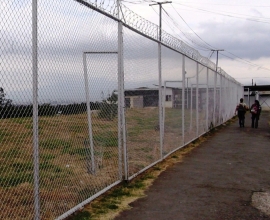Technical assistance in Panama for the creation of a Social and Vocational Integration Service for adolescents in conflict with the law
The creation of this service will serve as a connection between the adolescents deprived of liberty and the employing businesses or organizations
Within the framework of the EUROsociAL II programme, financed by the European Union, the International Juvenile Justice Observatory (IJJO) is lending technical support to the Institute of Interdisciplinary Studies (Instituto de Estudios Interdisciplinarios, IEI) in Panama for the social and vocational inclusion of young people and adolescents in prison. As part of this support, there was a consultancy service, workshop and a visit for the preparation of a guide for the creation of a Social And Vocational Inclusion Service that will serve as a connection between the adolescents deprived of liberty and the employing businesses or organizations.
One of the main problems that occur when it comes to the vocational inclusion of young people in conflict with the law is the need for an inter-institutional link as well as the lack of a service department or office that can guarantee the monitoring of these inclusion processes and the link between the public and private sectors.
In response to these requirements, an approach was adopted aimed at the implementation of the Social and Vocational Inclusion Model, by means of a specialised consultancy service for the design of the guide governing the creation of a Social And Vocational Inclusion Service (SIS). The guide will lay down a roadmap that will encompass the competences, functions, resources and processes necessary for the creation of said service. It will also define necessary meeting points where adolescents can interact with the employers.
The activity opened with the presentation of the objectives of the SIS to public and private organizations as well as businesses and business groups, potential contractors for the group. The day’s events were attended by the Deputy Minister of Governance, Maria Luisa Romero, and the Director of the IEI, Emma Alba Tejada. The activity included a visit to the Custody and Compliance Centre in Pacora, where there were meetings between IEI professionals assigned to the launching of the SIS. Moreover, there were meetings with the IEI directive team to create the new Work Plan and the ensuing steps.
After identifying the infrastructures, spaces and teams that it will require from the SIS, as well as the businesses and organizations involved in this service, the IJJO, in coordination with the IEI, will begin to work on the formulation of a protocol in collaboration with those working on Social and Vocational Inclusion. It will also work on the implementation of a Protocol of Interinstitutional Coordination. This procedure has been led by the expert Sergio Borras.
The IJJO, together with the COMJIB (Conference of Ministers of Justice in Ibero-American Countries) is an operational partner in the Social and Vocational Inclusion of Adolescents Deprived of Liberty (coordinated by Expertise France) within the EUROsociAL II, whose objective is the provision of technical support for the implementation and improvement of public policies regarding the social and vocational inclusion of people deprived of liberty.
Panama is one of the countries benefitting from this line of action. The IJJO has been providing technical assistance in Panama since 2013, specifically to the IEI, a dependent body of the Ministry of Government. The collaboration began with the development of the Strategic Plan for Social and Vocational Reinsertion for adolescents in conflict with penal law, which was approved and ratified by the responsible Panamanian authorities in April 2014.
OIJJ

